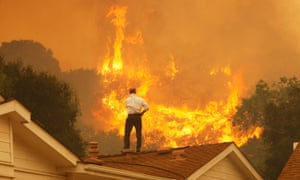 |
| A crescendo of scientific studies paints an alarming picture of the human suffering in store due to disrupted weather patterns, rising seas, droughts and climate-enhanced superstorms (AFP Photo/Dominique Faget) |
Some of these consequences may be avoided if humanity radically curbs its use of fossil fuels in coming decades, but many are already being felt, they said at the opening of a two-day conference run by the World Health Organization (WHO) and hosted by France.
"Health and climate are inextricably linked because human health depends directly on the health of the planet," French environment and energy minister Segolene Royal told participants.
Royal, also the rotating president of UN-led talks on how best to cope with global warming, said health impacts must play a more central role in future negotiations.
"From now on, I will do my best to ensure that health is integrated into all future climate conferences," starting with a special forum at the next high-level gathering of the 196-nation UN climate meeting in Marrakesh in November, she told AFP.
The Paris Agreement, inked in December last year, calls for holding global warming to well under two degrees Celsius (3.6 degree Fahrenheit), and helping poor nations cope with its impacts.
A crescendo of scientific studies paints an alarming picture of the human suffering in store due to disrupted weather patterns, rising seas, droughts and climate-enhanced superstorms.
Tropical disease vectors -- for malaria, dengue and zika, to name a few -- are expanding as the insects that carry them spread following warming climes.
Extreme heat waves set to occur every decade rather than once a century will claims more lives, especially the ill and the elderly.
The WHO estimated in 2005 that killer hot spells claim 150,000 lives annually. More than 45,000 died in Europe alone due to a heatwave in the summer of 2003.
Most worrying of all, perhaps, is the threat to global food supplies.
"Can we feed so many people" -- nine billion by mid-century, according to UN projections -- "when the climate that supports us is changing so adversely?", Letizia Ortiz, the Queen of Spain and a special ambassador to the Food and Agriculture Organization, asked the plenary.
Many staple foods, especially in the developing world, cannot adapt quickly enough to changing weather, resulting in lower yields.
 |
| French Environment Minister Segolene Royal (L) and Spain's Queen Letizia walk during the opening of the 2nd Global Conference on Health and Climate on July 7, 2016 in Paris |
Sometimes it is the sources, rather than the impacts, of manmade climate change that damage health.
The WHO estimates that seven million people die each year from air pollution, which also contributes to global warming as a greenhouse gas.
"The health sector has been under-represented in this discussion when you think about the millions of lives that will be affected, and even ended," said Richard Kinley, the interim head of the UN climate forum.
"The world is already committed to important levels of climate disruption," he added.
"The health sector will have to deal with the consequences."
The Second Global Conference on Health and Climate will end Friday with a proposed "action agenda" for national governments.
Links



